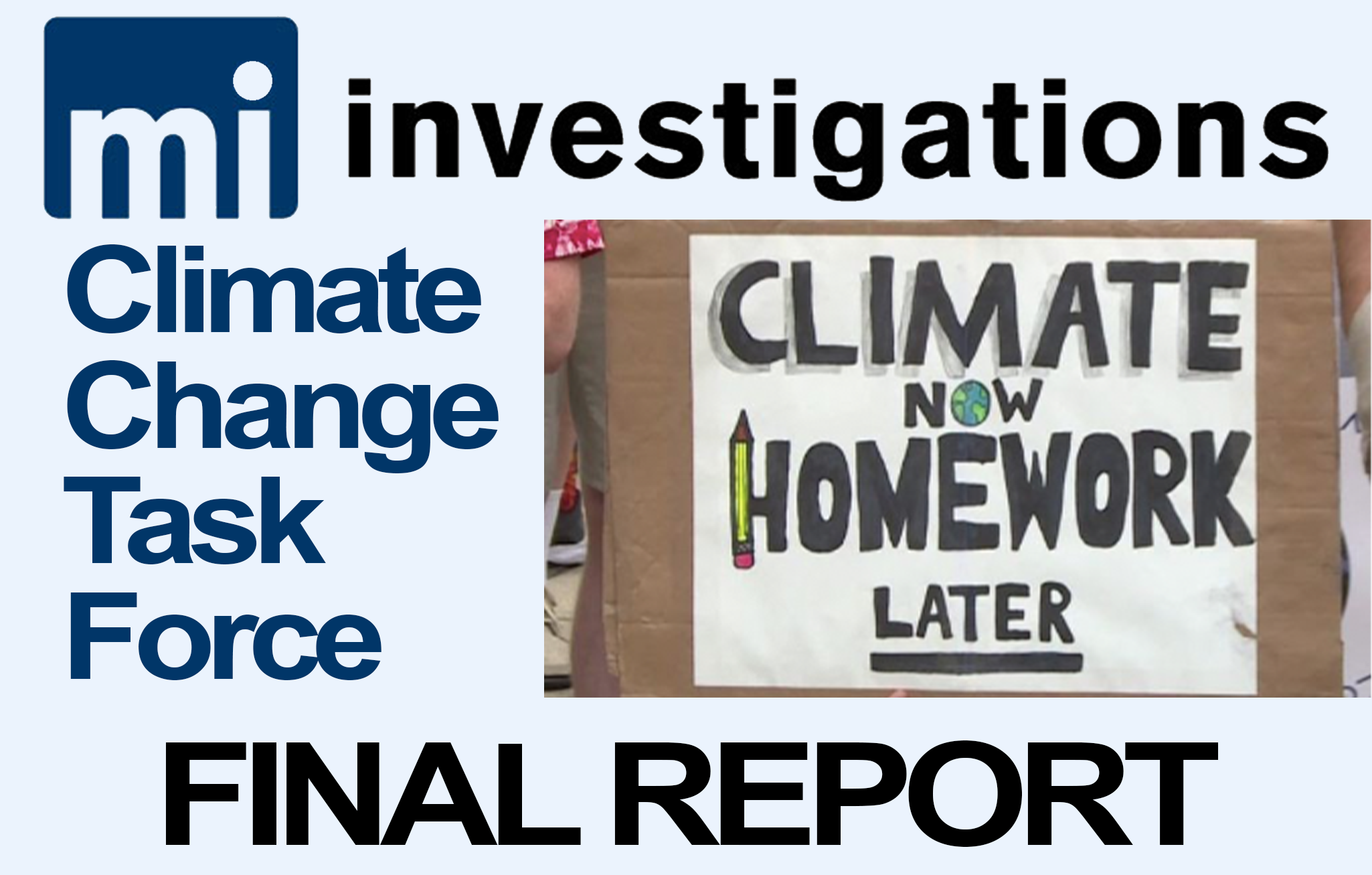
Evers’ Climate Change Task Force recommends economy-strangling regulations, K-12 and public indoctrination, assessing every project through a social justice prism, (social justice-based project assessments), and creating radical Office of Environmental Justice that will sue industries and local businesses
New legal standard would presume guilt for environmental crimes, not innocence
Gov’s Climate Change Task Force refuses to discuss the immense cost of their climate change policies. Final cost in the “trillions”
Radical recommendations would close down all coal plants, force you to drive alternative vehicles, and give the Attorney General new power to bully your business via subpoena, without court approval
December 28, 2020
By Lexi Dittrich
The Governor’s Task Force on Climate Change has issued a radical roadmap that will completely change the way Wisconsinites heat their homes, fuel their cars and power their businesses in pursuit of “the New Green Economy” and the goal to be carbon-free by 2050. The Task Force released the report, containing 55 recommendations, on December 9, 2020. The plan will force dramatic and expensive changes on Wisconsinites and our way of life so Governor Evers can force us to use only unreliable and pricey renewable energy. On top of this, the report repeatedly uses racial equity and climate justice as the reason why we need to act now. Anyone who opposes the plan is dismissed as a racist.
The report is full of ominous, overbearing ideas. If adopted, these report recommendations will deeply harm the Wisconsin economy and hit taxpayers and ratepayers with untold trillions in new taxes and increased energy bills. All at a time when many Wisconsinites are hurting financially from COVID-19 lockdowns and struggling to make ends meet. Strangely, or perhaps predictably, the report does not disclose nor discuss the cost of any of these radical ideas.
Super-Radical Policies
For this analysis, we will start at the end of the report. That’s where you find nine proposals that were too radical for every Task Force member to support.
The first proposal in this super-radical category recommends a stop to any future construction for fossil fuel plants. This is meant to fast-track Evers’ 2050 goal, but it will inevitably fast-track economic hardship for Wisconsin as well.
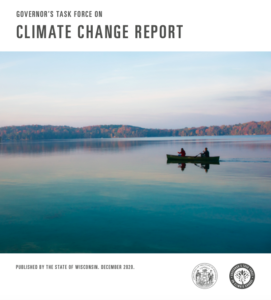 Forcing the rapid, unnatural death of our traditional fuel and energy sectors will kill all of the jobs they provide and kill the economic activity that those jobs provide our state. That elimination of fossil fuel jobs will take $1.16 billion in wages and productivity, per year, out of the Wisconsin economy. The Task Force claims the government will fill this gap with their green jobs program (discussed below), but there is no guarantee that this is likely to happen or even possible.
Forcing the rapid, unnatural death of our traditional fuel and energy sectors will kill all of the jobs they provide and kill the economic activity that those jobs provide our state. That elimination of fossil fuel jobs will take $1.16 billion in wages and productivity, per year, out of the Wisconsin economy. The Task Force claims the government will fill this gap with their green jobs program (discussed below), but there is no guarantee that this is likely to happen or even possible.
Reliable, cost-effective, existing coal plants will also be shut down under the Task Force’s report. The Task Force says they can ensure “cost-effective early closure and reduced use” of these coal plants, but there will always be a huge cost to closing these plants early. That cost will be paid by an increase in your energy bill.
Raising the cost of electricity is the last thing ratepayers need as the economy continues to recover from Wisconsin’s COVID-19 shutdowns. Our unemployment rate has skyrocketed this year, going as high as 14% and it is still too high today. Hundreds of thousands of restaurants and bars in Wisconsin have closed or will close soon because of the lockdown and the drag it creates on the economy. There could be no worse time than right now to propose a policy that would increase the cost of electricity in Wisconsin.
Another proposal would mandate that the State retirement fund eliminate all investments in the fossil fuel industry. The Wisconsin Retirement System (WRS) manages $116.3 billion in investments for over 650,000 government retirees in Wisconsin. The WRS is literally the only government retirement system in the entire country that is fully funded and because of that track record, the WRS is considered one of the best in the nation. Restricting how the professionals at WRS do their job and arbitrarily deciding what investments they can or cannot make will have a negative impact on the fund. Why would we put their track record at risk and gamble with the small monthly pension that over 600,000 government retirees depend on to live?
The Task Force report would continue to constrict our choices by manipulating the fuel market. The state would mandate higher prices for gasoline and diesel to disincentivize their use. Ultimately, the Task Force wants to compel people to switch to expensive alternative fuel vehicles. The Task Force recognizes that the use of electric vehicles is not mainstream yet. While we wait for that supposedly glorious day where everyone will drive an electric vehicle, the report recommends state promotion of cars powered by clean “bridge fuels,” such as compressed natural gas and propane gas. This assumes that everyone will have to buy a new vehicle, one that runs on propane or natural gas, while we wait for enough electric vehicles to be available for every household to purchase.
Other proposals in this super-radical category favor dangerous government control of the energy and agriculture sectors. One recommendation would demand that the Public Service Commission (PSC) recalculate electricity rates paid by homeowners and businesses. Those changes would penalize you for using efficient, tested, reliable electricity sources, and force you to use unreliable and costly renewable sources. We can’t stress this enough, the state government should not be dictating the choices that consumers sensibly make on their own. Government should not be arbitrarily making one energy source more expensive than another in pursuit of a radical green agenda.
Farms in the state would be managed by faceless bureaucrats if the Task Force has its way. The Task Force proposes for the Department of Natural Resources (DNR) and the Department of Agriculture, Trade, and Consumer Protection (DATCP) to “inform” farmers about using their farmland for solar farms and biodigesters, instead of for growing food. I can’t help but think of the nine most terrifying words in the English language “I’m from the government and I’m here to help.”
The policy assumes the government has the right to tell you what to do with your land, which poses a threat to any farmer who wants to have free control of their own property and their own livelihood. That kind of infringement on fundamental rights and freedoms is wholly unacceptable.
The final recommendation in this super-radical category would give the State Attorney General (AG) and the Department of Justice (DOJ) new dangerously broad powers to prosecute whole industries and local businesses for potential violations of antitrust laws. This provision is supposedly targeted at just the farming industry but it is doubtful that the AG would stop there if given this new club. The Task Force report recommends that the AG have civil investigative demand (CID) authority to investigate businesses that are suspected of dominating the market.
A CID gives an AG the authority to demand copious amounts of documents and records from a private business, without requiring any court approval. The recommendation would give the AG the authority to bully any business they don’t like into submission via subpoena. Even if a business hasn’t committed an antitrust crime, the AG could use the CID authority to scour a business from top to bottom until something is dug up to prosecute. All without court oversight or approval.
That’s a power that can never be undone. It’s a power that could affect any business, not just big dairy plants. It’s a power we would expect to see in brutal communist regimes, not in Wisconsin.
Policies like these are dangerously radical. They threaten to change our way of life, change how we run our businesses, change what we drive, and change how we heat our homes. Policies like these will choke and stymie our economy. If you think we are exaggerating or being a bit dramatic, remember what Lt. Governor Mandela Barnes said in 2019. Barnes believes that the world has failed to implement “common-sense solutions” to climate change because of “the pursuit of greed, it’s capitalism run amok.” He says America needs to “stymie” the growth of capitalism in order to stunt that pursuit of greed and solve the climate crisis. This is the same Lt. Governor Mandela Barnes who is the head of Gov. Evers’ Climate Change Task Force and the driving force behind this report.
We also refuse to let a misguided president determine our future. I'm honored to be surrounded by so many people from around the world who have chosen to lead in the face of adversity. #COP25 #wearestillin https://t.co/Mo9riRzJnL
— Mandela Barnes (@TheOtherMandela) December 6, 2019
Other Radical Policies: Government-Required Climate Change Brainwashing And Racism Re-Education
One report proposal recommends statewide climate change education in all K-12 schools, public and private. The Task Force keeps the idea vague, knowing full well that this is a controversial proposal. This recommendation would require that schools teach our kids about climate justice and social justice alongside environmental science. After all, the Task Force made it clear in this report that they think climate justice is inseparable from critical race theory and other radical lefitst ideas. Get ready for more climate protests and equity curriculum taught to your young children. To view our past work on the radical curriculum that’s already being taught in Wisconsin classrooms, click here and here.
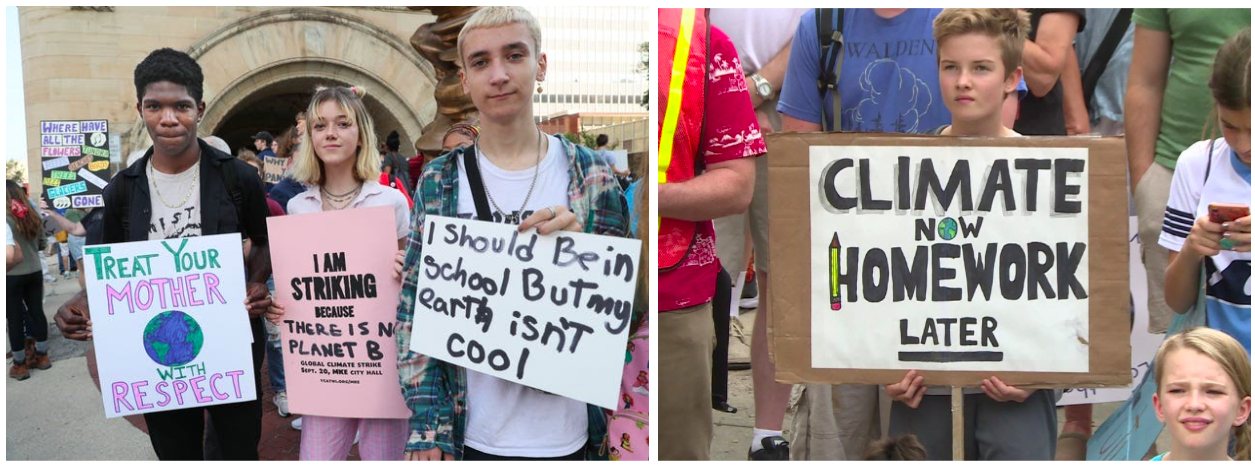
The Task Force also wants a public education campaign for adults to brainwash you into thinking that their recommendations are not only a net good, but immediately necessary to keep the world alive. The campaign would pressure Wisconsinites to take “urgent action to reduce carbon emissions.” Spurring urgency means scaring people, and how does the government scare people into going green? Think along the lines of Congresswoman Alexandria Ocasio Cortez’s (D-NY) rhetoric: “The world is going to end in 12 years if we don’t address climate change.”
In an obvious swing at GOP legislators, the Task Force included a proposal that requires anti-racism education for all state employees and all state legislators. The Task Force claims that the training is critical to stop the legislature from passing and supporting “racist” laws. In reality, just like the green “education” programs for K-12 students and the public, this is just another policy to brainwash senators and representatives who won’t agree to the Task Force’s social justice and climate justice demands during the next budget session.
Unrealistic, Expensive Energy Goals
To achieve the Governor’s 100% clean energy goal, the Task Force wants utility companies to reduce their carbon emissions to 60% below 2005 levels by 2030, and 100% by 2050. The private energy sector has worked hard, without government coercion, to reduce their emissions so far. The Task Force lauds that progress in their report.
The report cites that, between 2005 and 2017, CO2 emissions in Wisconsin decreased by 16% in the energy sector and 10% in the residential, industrial, and commercial sectors. That’s a great accomplishment, and the private sector is managing to do it efficiently, effectively, and on their own, without the fist of draconian green energy mandates looming overhead. But that great progress, it seems, just isn’t enough for the Task Force, which wants to achieve 100% renewable energy in the next 30 years. By all accounts, it doesn’t look like that goal is achievable.
Throughout Task Force meetings, members from the utility sector repeatedly said the total shift to renewable energy is only possible if battery technology is developed enough before 2050, which is doubtful. Until then, the executives say they are only able to produce 80-90% of their energy from non-fossil fuel sources. Even while members were discussing 80% renewable, they never talked about what cost customers will have to pay to reach that goal.
With current technology, non-carbon-based energy won’t be reliable enough or efficient enough to heat every Wisconsin home during our brutally cold winters, or cool them in the summer. Take, for instance, California, environmentalists’ green energy golden child. In 2018, about 32% of California’s energy grid was made up of renewable energy. In the summer of 2020, that same grid couldn’t meet energy demands. A major heat wave set off multiple days of rolling brownouts in the state, caused by the inability of their renewable energy grid to provide enough power.
The Task Force and Governor Evers have some of the same goals as the radical Red Rebels. All of them want zero carbon energy and emissions in the next few years, all of them want big investments in green energy, all of them want to force you to use public transportation instead of your own car, and all of them think the world is in crisis without immediate radical change.
Despite all the evidence to the contrary, the Task Force still preaches that 100% renewable energy in Wisconsin is achievable. Even if it was, their promise doesn’t matter until we know the cost of such an impactful change. In an outrageous move away from transparency, the Task Force refused in this report to say how much it will actually cost to reach 100% renewable energy. They didn’t tell you because they don’t want you to know how expensive their ideas will be for taxpayers, homeowners, ratepayers, and business owners. They also don’t want you to know how costly these changes will be to your way of life when you can no longer turn the lights on or heat your home when you need to. We do want you to know, and we happen to have a ballpark idea of what these policies are worth.
Think of when the Obama Administration was trying to implement the Paris Climate Accords and his Clean Power Plan. Through these policies, the Obama Administration committed to reducing the United States’ carbon emissions 32% by 2030, among other changes. That proposal was extreme at the time because of the price. Estimates showed that, by 2030, the average residential customer under this destructive green policy would pay an additional $225 a year for electricity. For the average commercial business, an additional $1,530 paid per year. Industrial businesses and manufacturers would have paid a shocking $105,094 more a year if the Paris Climate Accords and the Clean Power Plan were set in stone.
The Gov’s team wants to see a 60% reduction of emissions by 2030, not 30% like President Obama wanted. The estimates from 2016 have aged and Obama’s goals were even smaller than those from the Task Force today, therefore we can assume these estimated prices will be even more expensive today if the Governor’s Task Force’s policies go through. That’s a dangerously expensive prospect.
Adding insult to injury, the Task Force wants you to reduce how much electricity and gasoline you use, too. One of their proposals sets a new energy use reduction goal. The PSC would set these standards to reduce Wisconsin’s electricity consumption by 2% and natural gas and gasoline use by 1%. If the government is setting the limit, then they have the power to compel you to follow the limit by reducing how much you heat your home or business or how much you drive. All of that makes for more government intrusion and less freedom for you.
More Government, More Waste, And More Interference In Your Life, Plus A New Standard That Presumes Guilt, NOT Innocence
Cornerstone to enforcing the Task Force’s radical agenda is the creation of an Office of Environmental Justice. The office would be staffed with bureaucrats who would seek out disadvantaged Wisconsinites who the Office believes are being harmed, intentionally or not, by a company or a facility. The state would respond to these conditions by suing businesses in order to achieve their twisted vision of equity.
Task Force member August Ball gave a presentation late last year that set the tone of what it would mean to enforce environmental justice. Ball said that businesses accused of injustices and “environmental racism” need to be brought to court and forced to prove their innocence. You read that right, businesses would be considered and presumed guilty, not innocent.

Innocent until proven guilty has been a bedrock of our judicial and legal system since our founding. Now, in the pursuit of social justice through climate change, that apparently no longer matters. This office has the potential to be a business-crushing fist, on entirely leftist ideological grounds. It’s imperative that we monitor what the Governor decides to do with this policy and speak up when the new office tries to bully businesses into social justice compliance.
The climate change report also includes proposals inspired by Congresswoman Ocasio Cortez’s Green New Deal. To start, the Task Force recommends a Wisconsin government-promoted statewide high-speed rail system. The rail isn’t a new idea to Wisconsin, but it’s an expensive idea that Wisconsin has rejected before. Constructing a statewide high-speed rail would cost untold billions of dollars that you, the taxpayer, have to cover. A study by the Competitive Enterprise Institute and Power the Future estimated that the average tax-paying household in Wisconsin would have to pay $9,000-20,000 per year in order to fund a new net-zero emissions high-speed rail in the state. The Task Force should consider how few people use the trains we already have, like the Hiawatha Line to Chicago, before they plan to build such an insanely expensive new one.
A couple of proposals, also inspired by the Green New Deal, would create a government green jobs pipeline to replace jobs in the traditional energy sector. Through a “just transition advisory committee” and “a green energy advisory council,” the Task Force wants the government to give out new, green, union jobs to workers who have been fired from the dying fossil fuel industry. The jobs would include “paid family leave, sick days, health insurance, and a fair wage.” Cushy, and expensive for taxpayers to fund. The government would also control “AmeriCorps-like” green job training programs across the state.
The Soviet-style centrally planning program sounds too good to be true, doesn’t it? Not only is the Task Force promising tons of clean energy jobs that presently do not exist–courtesy of the taxpayer dollar–but it is also assuming that the government knows better what our economy should look like than real-life customers. What could go wrong with that approach? Lots, in fact, including 13,450 fossil fuel jobs deleted, without a sure guarantee that the government will make enough green dream jobs to replace the loss.
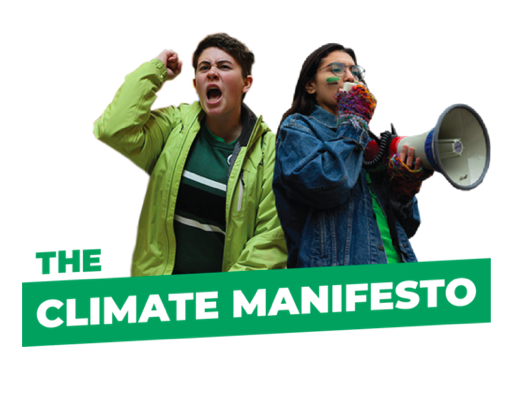
Another unsettling policy would develop a farming plan for subsistence (bare-minimum) farming communities like in Native American Nations. The government plan would manage Native crops and walleye, and then apply those policies to… urban areas? The Task Force says the changes will encourage people statewide, not just on Native American land, to “proactively grow and harvest their own food.”
It’s an extreme idea held by some of the more radical climate change groups to involuntarily force people to buy only local produce. That’s not the government’s job to decide, though. There’s also no justified reason to apply a farming plan for the needs of Native Nations to every other Wisconsinite who doesn’t live the same lifestyle as the Native Nations. The policy is a communist takeover of our food and our economy, and neither are a good thing. Rather, farmers and the consumers have the sole right to decide what food they choose to produce and consume.
Changing Rules And Regulations At The Expense Of Businesses And Taxpayers
The Task Force has a number of policy recommendations that would change state regulations and codes according to their climate justice whim. One of those policies, which the Governor or state agencies can adopt unilaterally, would update Wisconsin’s residential and commercial building codes.
Wisconsin’s building codes are adopted from model codes produced by the International Code Council (ICC). MacIver has reported at length about how the ICC has been rapidly adopting more radical green efficiency standards that will hike the cost of building a home. Tighter “green” regulations require higher standards for insulation and windows, and require light dimmers throughout homes, cross-conversion from gas to electrical appliances, and other increased requirements for energy efficiency. Each one of these changes fattens the cost of building a home.
As Wisconsinites continue to heal from our COVID-19 lockdowns, one of the last things they need is for the cost of living to increase with tighter building codes.
Currently, Wisconsin follows the ICC’s 2015 general codebook and the 2009 residential code book. Because Wisconsin state law does not allow local governments to update their own building codes, municipalities cannot enforce stricter codes than those from the 2009 and 2015 books. The proposal by the Task Force, though, would allow municipalities to implement stricter, more expensive building codes than the rest of the state.
The policy is another example of the government meddling with practices that have worked well since 2015 and 2009. Like we said above, any changes to efficiency standards of a home or a building increase the cost, making it harder to buy affordable homes.
The Task Force also recommends that every new development project in the state goes through state-mandated “independent racial disparity” studies. If the study subjectively deems a project “harmful” to any racial group, then a project proposal could be denied. This will make it more difficult to build any sort of project that the environmental extremists do not like. The government will only allow green and “equitable developments” to proceed. It’s the government picking winners and losers through radical and subjective racial justice criteria. Plus, agencies like the PSC already consider how projects will disparately affect different communities. All this proposal does is make it clear, only government-approved projects that fit within the green communism vision for the future need apply.
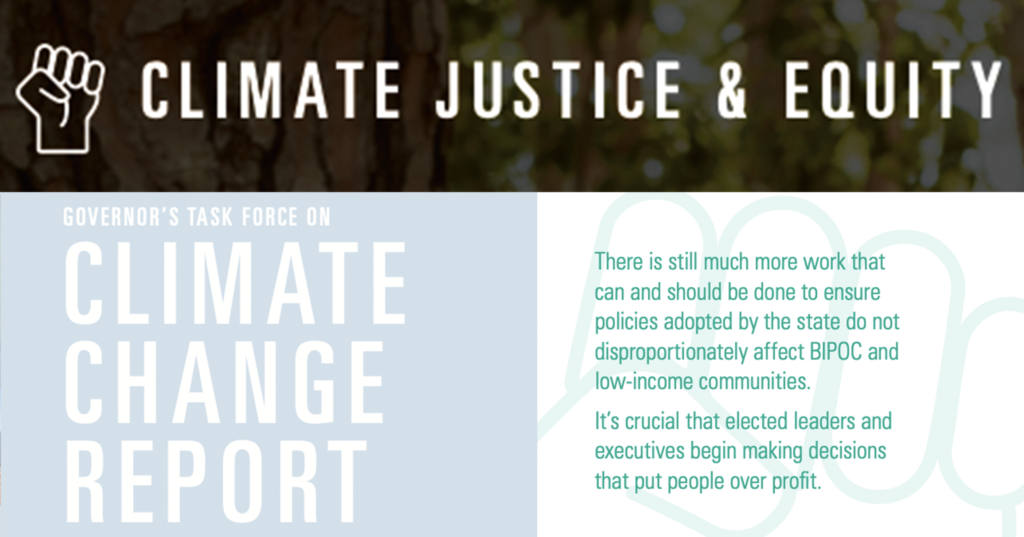
Another recommendation would require the Wisconsin Department of Transportation (WisDOT) to “perform climate and environmental justice impact analyses” before they approve any new road projects. These are the kinds of studies that would nit-pick at every project that emits CO2 during construction, allows cars to drive farther, or, God forbid, doesn’t include a bike or walking path. The Task Force seems to forget that the DOT already requires environmental impact assessments on projects. An environmental justice impact analysis would needlessly double the work on a project and make projects more difficult for, again, solely radical, politicized reasons.
The Task Force would also add to the hassle by requiring “complete streets.” Their “complete streets” recommendation would require road builders to incorporate bike and pedestrian streets on every new state-funded road project. Yes, that means walking paths will be required on new highways.
The requirement adds a huge cost onto any future road project. A 2017 MacIver investigation revealed that adding bike and pedestrian paths costs $200,000 extra per mile constructed, on top of the regular price of a road construction project.
Part of implementing complete streets involves eminent domain. That’s right, the Task Force would have the government use your tax dollars to take part of your property, use more of your tax dollars to build bike and walking paths that citizens won’t use, while municipal roads continue to suffer with unfilled potholes. What an utterly ineffective reason for infringing on your sacred property rights.
Another Task Force policy was originally proposed through legislation by member and Representative, Greta Neubauer (D-Racine). The Task Force report recommends passing her social cost of carbon bill, which would charge $50 per ton of carbon dioxide that an operation puts into Wisconsin’s air.
Plain and simple, this is a carbon tax on businesses, particularly in the fossil fuel or manufacturing industries. The Task Force shied away from also recommending a “carbon fee and dividend” tax in the final report, although it was discussed at length while they developed their final proposals.
Carbon fees and dividends would tax carbon emissions at the source, like taxing oil fields, coal mines, and carbon fuel importers. This is very similar to Neubauer’s social cost of carbon, only her policy taxes carbon based on the quantified social harm that the emissions supposedly cause.
Jonathan A. Lesser from The Manhattan Institute writes that a carbon tax at the source wouldn’t exclusively affect the source of carbon-based energy, though. It would inevitably reach all levels of our economy “because energy is used to produce virtually all goods and services.” Likewise, taxing Wisconsin manufacturers on their emissions will ultimately raise the price of anything the manufacturers produce.
As Grover Norquist of Americans for Tax Reform notes, “a carbon tax raises the cost of heating your home in the winter and cooling your home in the summer. It raises the cost of filling your car. A carbon tax increases the cost of everything Americans buy and lowers Americans’ effective take home pay.”
Adding a carbon tax onto our energy producers, industrial paper and car producers, and any other manufacturing operation in Wisconsin makes the state a much less favorable place to do business. A policy like this will drive some manufacturers away and kill some small businesses, while giving another incentive for expensive, inefficient green energy operations to take their place. The tax will also, again, raise the price of anything you buy.
The Recovery Wisconsin So Desperately Needs Will Not Be Possible If Barnes’ Green Economic Shutdown Becomes Law
In a piece by the Wisconsin State Journal, Lieutenant Governor Barnes described the recommendations as “a tremendous opportunity for our state to recover — to recover from the pandemic … and also to build a state that is resilient.”
Recovery, however, won’t be possible under the Task Force’s proposals.
The policies in the report will only lead to higher electricity and heating bills, more job-killing regulations and greater costs to build your first house or a new plant. These green economic overhaul policies will also ultimately lead to greater government control of you and how you live your life.
But Barnes and the Task Force don’t want you to know about any of that. They refused to discuss the consequences of their proposed policies, just like they refused to discuss how much their policies will cost the Wisconsin people. This lack of transparency and honesty regarding their goals speaks volumes to the radical nature of the Task Force’s ideas. They know most Wisconsinites will never agree to their proposals if the Task Force told you how invasive, controlling, pricey, and absurd they really are.
Wisconsinites would know the Task Force doesn’t have the state’s best interests in mind if they knew what these proposals really mean. Keep this in mind when the Task Force brings these proposals to the floor next year.